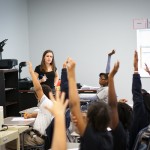10.09.13Bridget McElduff and the Live Edit Show Call
That Bridget McElduff- Every time I visit her classroom there’s something new to borrow. Today it was a brilliant new wrinkle on Show Call, with a little Check For Understanding/Culture of Error thrown in.
Show Call, in case you haven’t come across it, is a brilliant adaptation on Cold Call where a teacher assigns independent work for a period of time and then Cold Calls a student (or students) not by asking for the answer verbally but by taking their paper and projecting it for analysis and discussion via LCD projector.
Its benefits are myriad- teachers who Show Call can not only hold students accountable for the quality of independent written work during class but they can celebrate great student work and allow students to model their work on successful peers. Not only that but they can bring grist and substance to the editing process. Instead of asking students to comment on one others’ work based on the gauzy threads of memory and vague recollection they can ask them to comment of work that’s being projected, that everyone can see, and therein make the conversation specific: “I like this specific detail in this sentence” rather than “I like her details,” or, even better, “I like this sentence and it would be even better if she added X.”
Anyway, Bridget took all that up a notch today in her 5th grade math class. She reviewed a problem on the board that many students got right. Then she asked who didn’t get it. A few students raised their hands and she said, “Well, why don’t we take a look.” She Show Called one of the students who’d gotten it wrong and projected his paper on the LCD- there was a simple error. Students diagnosed it and she had them walk the student through the solution. But as they began doing this, Bridget unplugged her LCD projector and brought it, and the paper, back to the student’s desk. As they narrated the fix, he corrected his own error. When they were done there was much praise for him, his willingness to share his mistake and his success in fixing it. The process not only made the solution to the math problem visible, it made the principle of success in school–not being afraid to learn from mistakes–visible.
You can bet her version of Show Call will be in TLAC 2.0. Thanks, Bridget!


Thanks for the great post Doug! The idea of mistakes is evident here and builds great student thinking!
More i watch great teachers the more i realize building a culture that values error is at the center of it all.
I agree, how do you think this could look in kindergarten and first grade? We seem to struggle with allowing those students to feel like mistakes are important, instead we try to tell them that there is only one correct way. I have found that when students get to third grade and have not experienced that culture of mistakes, it takes quite awhile for the students to feel ok in that culture. Would you have any recommendations for kindergarten and first grade teachers that would help?